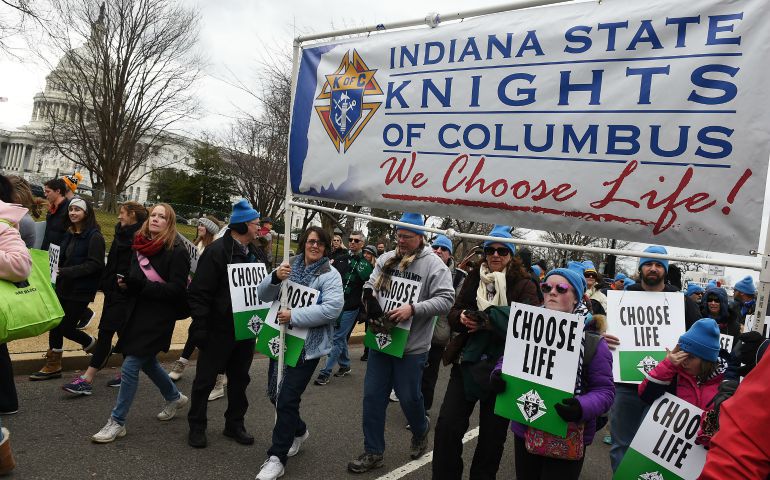
Pro-life advocates with the Indiana State Knights of Columbus carry a banner past the U.S. Supreme Court Jan. 27 during the annual March for Life in Washington. (CNS photo/Leslie E. Kossoff)
I have observed a tendency in contemporary debates to import political categories into religious discussions, with confusing and sometimes unfortunate consequences. The church's beliefs do not align with the Democratic or the Republican parties' platforms. Observant Catholics will find themselves making common cause sometimes with people on the political right, sometimes on the left, and this is as it should be. Catholic Relief Services does its work of humanitarian assistance with help from organizations that disagree with the church on family and life issues. That kind of cooperation is a good thing, so long as we don't compromise our own principles.
A recent article in National Catholic Reporter written by NCR editor-at-large Tom Roberts blames the Knights of Columbus for engaging in this sort of cooperation. The May 15 article, "Knights of Columbus' financial forms show wealth, influence," acknowledges the immense good the Knights do. In the past decade, they have given $1.55 billion to charity (several million to my own university), and the members have done more than half a billion hours of charitable service. The world would be a better place if it had more such organizations.
But the article suggests that the Knights' generosity is a cause for concern rather than celebration, for two reasons. The first is that "the Knights are deeply engaged in the culture wars" in league with conservative actors and groups. They support pro-life efforts, church teaching about love and marriage, religious freedom, evangelization, and the John Paul II Shrine and Institute.
All of these things are causes that the Catholic Church wholeheartedly endorses. It is true that in our culture the church's allies (on these efforts) are more often found on the political right. But it would be odd to say that we should abandon our religious principles because some folks don't like the people we share them with.
And who are those people? The article refers to "the organization's favorite pope," John Paul II, with the subtle implication that he is now out of fashion. But he is a saint, a man we all honor. The article implicitly condemns a gift of $1.5 million to the Archdiocese of Philadelphia, whose archbishop "is a leading voice for the conservative wing of the U.S. bishops' conference." The gift was made to help pay for the visit of Pope Francis to the city of Philadelphia. Does Francis represent the conservative wing of the church? The Becket Fund is listed among "the loudest and most influential participants in the church and the public square." It has represented (free of charge) the Little Sisters of the Poor in their challenge to the U.S. Department of Health and Human Services' contraceptive mandate. Are Paul VI's 1968 birth control encyclical Humanae Vitae and John Paul's 1995 encyclical on the human person Evangelium Vitae no longer the teaching of the church?
To be sure, these are not the only things the church teaches. We are also concerned about health care and immigration and the environment — issues on which the church has more in common with the political left in our country. But the Gospel does not require us, in doing works of charity, to divide our efforts so that every needy cause and person receives an aliquot share. St. Frances Cabrini devoted her life to caring for immigrants. Should we condemn her because she paid no attention to the environment?
This is the article's second point, that we should be concerned about the Knights' generosity, not just because it supports a finite number of causes, but also because its "influence can actually distort the church's ecclesiology, its structure and its governance." National Catholic Reporter is concerned that there is no organization, equally generous and influential, that represents people with "differing theological views" or "Catholics in the developing world." The article quotes a church historian and theologian, Massimo Faggioli, for the proposition that "the voice of the faithful, should be equal for all the faithful."
I'm not sure where this proposition is to be found in the theological canon. It is a fashionable principle with some on the American political left, who have argued for limiting campaign contributions, or for public financing of electoral campaigns, to assure equal political influence to rich and poor alike.
But transposed to this field, it seems perverse. Bishops are not elected. The Knights do not contribute money to or for episcopal war chests. They help to broadcast the pope's Christmas Mass and ecumenical gatherings in Assisi; to provide free sonograms for pregnant women; to support the March for Life. Is the idea that the Knights should limit their generosity to what other groups are capable of doing, so the church's magisterium should not seem unduly grateful to them?
Surely not. It would be something else entirely if the Knights were actively opposing some of the church's teachings. But that is not the case, nor does the article suggest it is. The article's argument is that the Knights have done something wrong in devoting their attention to a and b (both admittedly worthy causes), but not c and d, because their friends who support a and b are not aligned in all matters with the church. I say that in a pluralistic society like ours we need to accept help where we find it, in living out the virtue of charity.
[John Garvey is president of The Catholic University of America.]



